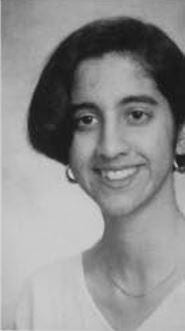Abstract
In this interview, Tejal Ashwin Desai, class of 1994, discusses her educational and professional path to becoming professor and chair of the Department of Bioengineering and Therapeutic Sciences at University of California – San Francisco. She begins by sharing some personal background including the immigration of her parents to the United States from India and conflict in displaying her heritage outside of her home. She goes on to explain that she chose to attend Brown University as an undergraduate because she knew she wanted to pursue engineering but also wanted to embrace her other interests and passions. Brown’s open curriculum allowed her to do that.
Desai recalls her heavy involvement in student activities at Brown such as the admissions committee and student government, and emphasizes the Third World Transition Program – a program that welcomes new students to Brown and provides an exploration of systems of oppression that exist in our society today, including racism, classism, sexism, cissexism, heterosexism, ableism, and imperialism. She asserts that this program was her first introduction to Brown, and made her feel excited to be there. The program also cemented her friendships and community. Desai also mentions some difficult times she had at Brown, namely the lack of support she felt as a woman in engineering. She says that her advisor was quick to turn her away from the program after some academic challenges in her first semester and admits to finding mentors outside of the engineering program who would encourage her to continue pursuing that track. Edith Mathiowitz, Professor of Medical Science and Engineering, was the most influential faculty member for Desai.
Desai continues the conversation with reminiscences of applying to graduate schools and jobs simultaneously and explains that she chose to attend the joint University of California – San Francisco and University of California – Berkeley bioengineering program. Again, she continued her interests in engineering research and education as well as community outreach. Desai notes that the decision she made to join the lab of a civil and materials engineer allowed her to work on research that made her a leader in the emerging field of bionanotechnology.
She remembers her first post-graduate position as an assistant professor in bioengineering at University of Illinois – Chicago and her experiences of presumed sexism and ageism that posed some challenges in continuing her research there. She talks about her husband’s encouragement to pursue an associate professor position at Boston University and then tenured professor position at University of California – San Francisco. She also explains negotiating for the tenured position and for childcare as part of that contract.
Desai concludes her interview by discussing the value of STEM programs for middle school children and the need to retain girls and women in science.
Recorded on December 5, 2017 in San Francisco, CA
Interviewed by Mimi Pichey
Suggested Chicago style citation: Desai, Tejal Ashwin. Interview. By Mimi Pichey. Pembroke Center Oral History Project, Brown University. December 5, 2017.
Biography
Tejal Ashwin Desai was born in Huntington Beach, California in 1972 to Indian parents and spent most of her early life in Santa Barbara. She attended Brown University where she received her bachelor of science in biomedical engineering in 1994. In 1998, she graduated with a Ph.D. from the joint University of California – San Francisco and University of California – Berkeley Bioengineering department. Desai held professorships at University of Illinois – Chicago and Boston University. In 2005, she relocated to University of California – San Francisco where she became a tenured professor in the department of physiology while she built a bioengineering department. In 2009, she joined the Department of Bioengineering and Therapeutic Sciences, a department that she currently chairs. During this time, Desai married, had three children, and concurrently volunteered her time to advancing minority students and women in science. Desai’s research applies microscale and nanoscale technologies to create new and improved ways to deliver medicine to target sites in the body and to enable the body to heal itself.
